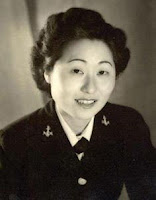 |
| Photo: Courtesy Defense.gov |
In 1902, Susan’s parents, Dosan Ahn Chang Ho and Helen Ahn, were the first Koreans to legally immigrate to the United States. A protestant activist, Chang Ho made several trips back to Korea, as well as China, where he led Korean independence movements. He and his wife opened their home as headquarters for the Young Korean Academy that taught leadership skills to Korean immigrants.
Reports differ as to the last time the family saw Chang Ho, but his arrest in 1932 sealed his fate. He was sentenced to five years in prison. Almost as soon as being released, he was again arrested, but by then he was suffering from some sort of illness. He was transferred to Keijo Imperial University where he would pass away on March 10, 1938.
During his time in America, Susan’s father stressed to all five of his children to never forget their
 |
| Photo Credit: Philip Ahn |
As a result, three years after her father’s death and the bombing of Pearl Harbor, Susan knew she had to do something to fight the Japanese that had imprisoned him. By June 1942, the Navy had created the WAVES program that allowed women to join their ranks. Unsurprisingly, Susan’s application was rejected because of her race. Undeterred, she reapplied and was accepted in December 1942.
 |
| Author Photo |
Because of her ability to speak Korean, she was transferred to the U.S. Naval Intelligence Office where she worked with codebreakers. However, prejudice raised its ugly head again when one supervisor refused to allow her near classified documents because of her race. She quietly proved herself and was chosen to be the organization's liaison with the Library of Congress.
In the waning days of the war, Susan met fellow code-breaker Francis “Frank” X. Cuddy, an Irish-
 |
| Courtesy of Philip Ahn |
Frank and Susan continued to work in intelligence at the National Security Agency until their retirement. Frank passed away in 1978 and Susan in 2015 at the age of 100.
_______________________
Francine’s Foibles
She's given up hope. He never had any. Will they find it together?
World War II is finally over, and America is extra grateful as the country approaches this year’s Thanksgiving. But for Francine life hasn’t changed. Despite working at Fort Meade processing the paperwork for the thousands of men who have returned home, she’s still lonely and very single. Is she destined for spinsterhood?
Grateful that his parents anglicized the family surname after emigrating to the United States after the Great War, first-generation German-American Ray Fisher has done all he can to hide his heritage. He managed to make it through this second “war to end all wars,” but what American woman would want to marry into a German family. Must he leave the country to find wedded bliss?
Pre-order Link: https://amzn.to/3qw2U67
Linda Shenton Matchett writes about ordinary people who did extraordinary things in days gone by. A native of Baltimore, Maryland, she was born a stone’s throw from Fort McHenry (of Star-Spangled Banner fame) and has lived in historical places all her life. She is a volunteer docent and archivist at the Wright Museum of WWII and a former trustee for her local public library. She now lives in central New Hampshire where she explores the history of this great state and immerses herself in the imaginary worlds created by other authors. http://www.LindaShentonMatchett.com




Thank you for telling the story of this amazing woman. Her birth family's philosophy is commendable as well.
ReplyDeleteThanks for your support and stopping by. I agree with you about her family's philosophy.
Delete